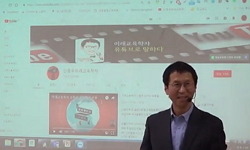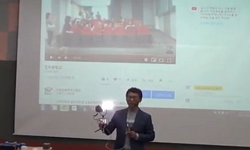미술교육은 미적 안목을 육성하고 조형능력을 함양하며 창의성을 계발하여 미적 인간을 기르는데 그 목적이 있다. 미술은 문제를 해결하는 답을 구하는데 있어 옳거나 그른 방법이 없고 단...
http://chineseinput.net/에서 pinyin(병음)방식으로 중국어를 변환할 수 있습니다.
변환된 중국어를 복사하여 사용하시면 됩니다.
- 中文 을 입력하시려면 zhongwen을 입력하시고 space를누르시면됩니다.
- 北京 을 입력하시려면 beijing을 입력하시고 space를 누르시면 됩니다.
중학교 미술과 수업에서의 재료 활용에 관한 실태 조사 = (A) Study on Materials and Contents in Art Class at Middle Schools : A focus on the middle schools in Seoul
한글로보기https://www.riss.kr/link?id=T8008788
- 저자
-
발행사항
서울 : 이화여자대학교 교육대학원, 2000
-
학위논문사항
학위논문(석사) -- 이화여자대학교 교육대학원 , 미술교육전공 , 2000. 8
-
발행연도
2000
-
작성언어
한국어
- 주제어
-
KDC
376.5465 판사항(4)
-
발행국(도시)
서울
-
형태사항
vi, 66p. : 삽도 ; 26cm.
-
일반주기명
참고문헌: p. 55-56
- 소장기관
-
0
상세조회 -
0
다운로드
부가정보
국문 초록 (Abstract)
미술교육은 다양한 재료 경험을 통하여 환경을 다양한 시각으로 보는 능력을 길러 주고 시각적 대상을 새로운 차원에서 표현하는 창의성을 길러주며 조화로운 품성과 미적 감각을 길러주는 정서 교과로서의 본질을 지니고 있다.
그러나 실제 미술 수업에서는 여러 가지 이유로 교과서에 실린 내용 중 일부 만이 반복적으로 실시되고 있고, 한정된 재료를 이용한 수업으로 인해 학생들의 창의적인 사고력을 향상시키지 못하고 있다.
본 연구는 현행 교과서를 중심으로 내용과 사용재료를 살펴보고, 서울특별시 소재 중학교를 질문지를 이용하여 수업내용과 사용 재료를 조사하였다.
가장 많이 실시되고 있는 회화영역에서 특히 편중된 재료 사용이 나타나고 있다. 소묘에서는 대부분 연필을 사용하고 있고, 채색화에서는 수채물감이 많이 사용되었다. 한국화 수업에서는 적절한 재료가 갖추어지지 않은 채, 수채용 도구나 서예용 도구로 대체 사용되고 있다.
다양한 재료와 기법으로 실시할 수 있는 판화, 조소, 디자인 수업에서도 학교 시설과 시간, 학생들의 경제적 부담 등을 고려하여, 한정된 재료에 국한된 수업이 진행되고 있다. 입체구성에서 비교적 여러 가지 재료를 다루고 있는 것으로 나타났다.
부족한 수업 시간 수로 중학생 수준에서 가능한 수업도 심도 있게 다루어지지 못하고 있으며, 학생들이 자신의 작품을 평가하고 느낌을 정리할 기회도 갖지 못한다. 또한 저가의 품질이 떨어지는 재료나 대체 재료를 이용함으로써 재료의 특성, 효과, 올바른 사용방법을 체험하지 못한다.
다양한 재료를 이용해 작품을 제작해 보는 것은 폭 넓은 경험을 제공하고, 창의력 신장을 도와준다. 매년 반복적으로 사용되는 재료나 표현방식이 아닌 학생들이 체험해 보지 못하여 호기심과 창작의욕을 자극할 수 있는 양질의 재료 선택과 올바른 사용법 표현 방법상의 특징, 작품의 감상 태도 등을 지도할 수 있는 수업이 되도록 교사들의 적극적이고 체계적인 준비가 있어야 한다. 또한 다양한 재료를 이용한 수업이 가능하도록 학교의 시설과 적정 수업 시간의 배정이 뒷받침되어야 한다.
미술교육은 미적 안목을 육성하고 조형능력을 함양하며 창의성을 계발하여 미적 인간을 기르는데 그 목적이 있다. 미술은 문제를 해결하는 답을 구하는데 있어 옳거나 그른 방법이 없고 단지 학생들에게 상상력을 사용할 기회와 다양한 문제 해결책을 만들어 낼 기회를 제공해 준다.
미술교육은 다양한 재료 경험을 통하여 환경을 다양한 시각으로 보는 능력을 길러 주고 시각적 대상을 새로운 차원에서 표현하는 창의성을 길러주며 조화로운 품성과 미적 감각을 길러주는 정서 교과로서의 본질을 지니고 있다.
그러나 실제 미술 수업에서는 여러 가지 이유로 교과서에 실린 내용 중 일부 만이 반복적으로 실시되고 있고, 한정된 재료를 이용한 수업으로 인해 학생들의 창의적인 사고력을 향상시키지 못하고 있다.
본 연구는 현행 교과서를 중심으로 내용과 사용재료를 살펴보고, 서울특별시 소재 중학교를 질문지를 이용하여 수업내용과 사용 재료를 조사하였다.
가장 많이 실시되고 있는 회화영역에서 특히 편중된 재료 사용이 나타나고 있다. 소묘에서는 대부분 연필을 사용하고 있고, 채색화에서는 수채물감이 많이 사용되었다. 한국화 수업에서는 적절한 재료가 갖추어지지 않은 채, 수채용 도구나 서예용 도구로 대체 사용되고 있다.
다양한 재료와 기법으로 실시할 수 있는 판화, 조소, 디자인 수업에서도 학교 시설과 시간, 학생들의 경제적 부담 등을 고려하여, 한정된 재료에 국한된 수업이 진행되고 있다. 입체구성에서 비교적 여러 가지 재료를 다루고 있는 것으로 나타났다.
부족한 수업 시간 수로 중학생 수준에서 가능한 수업도 심도 있게 다루어지지 못하고 있으며, 학생들이 자신의 작품을 평가하고 느낌을 정리할 기회도 갖지 못한다. 또한 저가의 품질이 떨어지는 재료나 대체 재료를 이용함으로써 재료의 특성, 효과, 올바른 사용방법을 체험하지 못한다.
다양한 재료를 이용해 작품을 제작해 보는 것은 폭 넓은 경험을 제공하고, 창의력 신장을 도와준다. 매년 반복적으로 사용되는 재료나 표현방식이 아닌 학생들이 체험해 보지 못하여 호기심과 창작의욕을 자극할 수 있는 양질의 재료 선택과 올바른 사용법 표현 방법상의 특징, 작품의 감상 태도 등을 지도할 수 있는 수업이 되도록 교사들의 적극적이고 체계적인 준비가 있어야 한다. 또한 다양한 재료를 이용한 수업이 가능하도록 학교의 시설과 적정 수업 시간의 배정이 뒷받침되어야 한다.
다국어 초록 (Multilingual Abstract)
However, students cannot develop their creativity in art classes at school because only a few parts of the curriculum are selected repeatedly and taught to them with limited materials.
This paper deals with the contents and the materials in school textbooks and a survey of middle school teachers in Seoul which was made to see the real classroom activities and materials.
In the area of painting, the usage of materials is very limited: pencil in drawing, water color in color painting, substitutional materials in Korean painting.
In the areas of print, sculpture, and design which can deal with various materials and skills, only a few materials are used on account of facilities, time, and economic reasons. We can just find various materials in the area of constructions compared with other areas.
The lack of time in art class is another problem. It prevents students from taking intensive classes, and it makes students cannot have enough time to appreciate and evaluate their own work.
The usage of inferior materials in low price and substitutional materials is not good. It keeps students from learning the specific features, effects, and the correct usage of each materials through experience.
In conclusion, making works with various materials in art class is very important. It helps students to develop their creativity and gives a chance to experience. Selecting good materials to motivate students' interest is important. too. Therefore teachers' active and systematic preparation is needed to teach correct usages, features, and the way of appreciation. Improving school facilities and proper time allotment are also needed.
The purpose of art education is to cultivate artistic human beings by developing artistic judgment, formativeness, and creativity. Art presents not correct answers but various chances to develop creativity in the process of problem-solving to the stud...
The purpose of art education is to cultivate artistic human beings by developing artistic judgment, formativeness, and creativity. Art presents not correct answers but various chances to develop creativity in the process of problem-solving to the students. So art education has the characteristic of emotional subject which can cultivate students' characters, artistic sense, and creativity. And it is also important character to widen the students' view of environment through their experiences with various materials.
However, students cannot develop their creativity in art classes at school because only a few parts of the curriculum are selected repeatedly and taught to them with limited materials.
This paper deals with the contents and the materials in school textbooks and a survey of middle school teachers in Seoul which was made to see the real classroom activities and materials.
In the area of painting, the usage of materials is very limited: pencil in drawing, water color in color painting, substitutional materials in Korean painting.
In the areas of print, sculpture, and design which can deal with various materials and skills, only a few materials are used on account of facilities, time, and economic reasons. We can just find various materials in the area of constructions compared with other areas.
The lack of time in art class is another problem. It prevents students from taking intensive classes, and it makes students cannot have enough time to appreciate and evaluate their own work.
The usage of inferior materials in low price and substitutional materials is not good. It keeps students from learning the specific features, effects, and the correct usage of each materials through experience.
In conclusion, making works with various materials in art class is very important. It helps students to develop their creativity and gives a chance to experience. Selecting good materials to motivate students' interest is important. too. Therefore teachers' active and systematic preparation is needed to teach correct usages, features, and the way of appreciation. Improving school facilities and proper time allotment are also needed.
목차 (Table of Contents)
- 목차
- 논문개요 = v
- I. 서론 = 1
- A. 연구의 목적 = 1
- B. 연구의 내용 = 1
- 목차
- 논문개요 = v
- I. 서론 = 1
- A. 연구의 목적 = 1
- B. 연구의 내용 = 1
- C. 연구의 방법 = 2
- II. 미술교육과 창의성 = 3
- A. 미술 교육의 의의 = 3
- B. 창의성과 미술교육 = 4
- C. 중학교 미술과 교육과정 = 6
- III. 재료활용과 미술수업의 조건 = 11
- A. 재료선택의 중요성 = 11
- B. 재료와 표현가능성 = 11
- C. 미술 수업의 조건 = 13
- IV. 실태조사 및 분석 = 15
- A. 현행 8종 중학교 미술 교과서 분석 = 15
- 1. 중학교 미술 교과서의 영역별 내용 분석 = 15
- 2. 중학교 미술 교과서의 영역별 재료 분석 = 24
- B. 서울특별시 중학교 미술 수업 실태 분석 = 29
- 1 회화 수업 내용과 재료사용 실태 조사 분석 = 29
- 2. 조소 수업 내용과 재료사용 실태 조사 분석 = 41
- 3. 디자인 수업 내용과 재료사용 실태 조사 분석 = 47
- V. 결론 = 52
- 참고문헌 = 55
- 부록 : 설문지 = 57
- Abstract = 65












